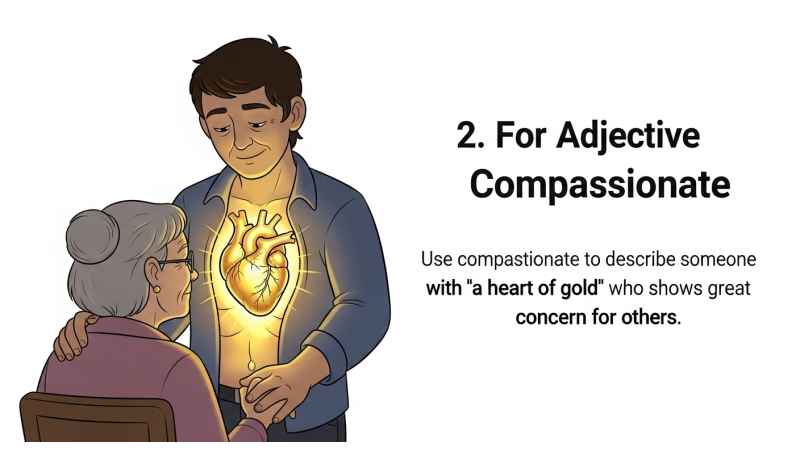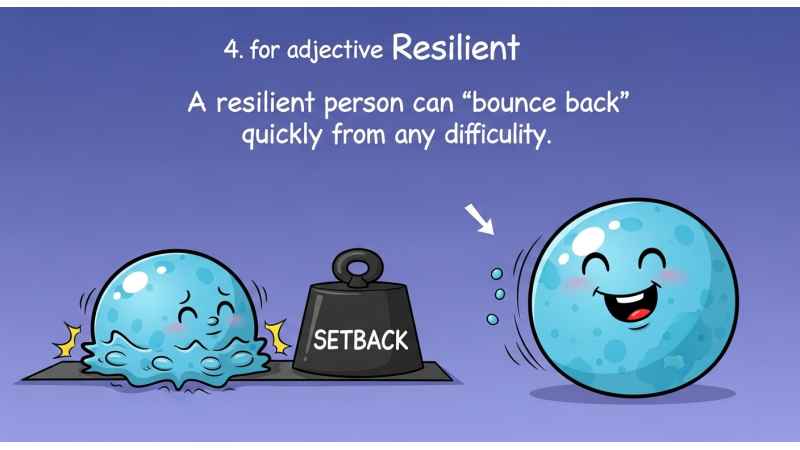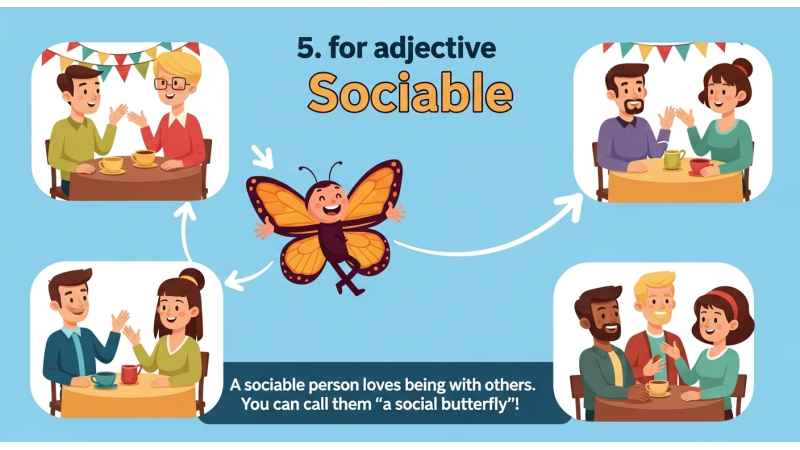Rich Personality Adjectives for IELTS Speaking
Building a rich vocabulary is key to doing well in the IELTS Speaking test. In fact, experts note that using precise, varied words to describe people can make your answers more vivid and engaging. For example, IDP’s official guide explains that a “rich vocabulary” “brings your descriptions to life” in speaking responses. Rather than relying on simple words like “nice,” it’s better to alternate with synonyms such as “friendly,” “amiable,” or “affable”. Using specific terms not only makes your descriptions more interesting, but it also demonstrates your lexical range – a key IELTS criterion.
Below, we present a list of powerful adjectives to describe personality traits. Each entry gives a meaning, example sentence (many from IELTS preparation sources), useful collocations, and a relevant idiom. Mastering these words – and knowing how to use them naturally – will help you speak more confidently and richly about people during the IELTS speaking test.
Essential Personality Adjectives (Positive)
- Ambitious – Having a strong desire for success or achievement. For example: “She is very ambitious and always aims to be the best in her field”. Collocations include “burning ambition,” “highly ambitious,” or “ambitious project.” An ambitious person is often called a “go-getter,” meaning someone who actively pursues their goals.

- Compassionate – Showing empathy and concern for others. For instance, “He is compassionate and often volunteers at the local shelter”. You might use “compassionate towards (someone)” as a collocation. A common idiom for a very kind person is “a heart of gold,” as in “She truly has a heart of gold”, meaning she is very generous and caring.

- Diligent – Hardworking and meticulous. “Her diligent efforts in her studies earned her top grades”. Collocations: “diligent student”, “diligently work,” or “a diligent worker.” (There isn’t a specific idiom for “diligent,” but you could say someone who works hard “goes the extra mile.”) Using diligent instead of “hardworking” adds precision to your answer.
- Empathetic – Able to understand and share the feelings of others. Example: “Being empathetic, she could easily understand her friend’s pain”. You can say “empathetic listener” or “empathetic person” as collocations. A useful expression is “put yourself in someone else’s shoes,” which means trying to feel what another person feels. For example: “He’s empathetic – he always puts himself in others’ shoes when they’re upset.”
- Generous – Willing to give and share unselfishly. As in “He is generous with his time and often helps his neighbours”. Collocations: “generous with (money/time),” “very generous,” or “a generous donation.” A common idiom is “the salt of the earth,” meaning a very good and honest person. For example: “She’s truly the salt of the earth – always kind and caring”.
- Honest – Truthful and sincere. “An honest person, she always tells the truth even when it’s difficult”. Collocations: “honest answer,” “honest opinion,” “honestly speaking.” For idioms, someone trustworthy may be called a “man of his word” or “woman of her word” (meaning they keep their promises). E.g. “You can count on him – he’s a man of his word”.
- Innovative – Creative and able to think of new ideas. “His innovative solutions to the problems impressed everyone”. Collocations: “innovative ideas,” “highly innovative,” “innovation in X.” An idiom for creative thinking is “think outside the box,” meaning to consider ideas in a new or unusual way.

- Kind – Friendly and considerate. “She is kind to everyone and always ready to lend a hand”. Collocations: “kind person,” “kind-hearted,” “act of kindness.” As with compassionate, you could say someone has “a heart of gold” (see above) to emphasize their kindness. For example: “My grandmother is so kind – she really has a heart of gold”.
- Resilient – Able to recover quickly from difficulties. “Despite the setbacks, he remained resilient and never gave up”. Collocations: “emotionally resilient,” “mentally resilient,” “resilient attitude.” A useful expression is “bounce back,” as in “She lost her job but bounced back by finding an even better one.” This shows she recovered from a setback.

- Charismatic – Charming and able to attract others. “His charismatic personality makes him a natural leader”. Collocations: “charismatic leader,” “highly charismatic,” “charismatic presence.” Idioms: such a person might be called “a born leader”, meaning they naturally take charge. E.g. “With her confidence and vision, she’s a born leader”. You might also say someone “lights up a room,” implying they are very engaging and charming.
- Optimistic – Hopeful and confident about the future. “Even in tough times, he stays optimistic and hopeful”. Collocations: “optimistic outlook,” “incredibly optimistic,” “optimistic about X.” Idioms: you can say someone “is a ray of sunshine,” meaning they bring happiness and positivity to others. For example: “My cousin is always smiling and upbeat – she’s really a ray of sunshine”.
- Sociable – Enjoying being with other people; outgoing. “She is a sociable person who loves meeting new people”. Collocations: “very sociable,” “sociable personality,” “naturally sociable.” Idioms/Collocations: Such a person could be described as “a social butterfly” (meaning they flit from group to group and enjoy chatting with everyone). For example: “My aunt’s an incredibly sociable woman – she really is a social butterfly”.

- Humorous – (IDP example) Amusing and having a sense of fun. “The talk was humorous and entertaining”. Collocations: “good sense of humor,” “naturally humorous,” “dry sense of humor.” One collocation to learn is “have a sense of humor,” meaning to be funny or appreciate jokes. For example: “I love working with Mark because he’s so humorous; he always has a great sense of humor.”
Each of the above adjectives can be practiced in sentences or answers. Notice how the examples from preparation materials often pair the adjective with concrete examples or collocations – this makes your speech richer and more precise. In your answers, try to mix in some of these collocations or idiomatic expressions (e.g. “go-getter,” “heart of gold,” “social butterfly,” etc.) to sound more natural and engaging.
Sample IELTS Speaking Answers
Below are example answers for each part of the IELTS Speaking test. These sample responses use the adjectives, collocations and idioms above. The Examiner’s questions are in italics, and the Candidate’s answers show how to use descriptive vocabulary fluently.
Part 1 (Introduction & Interview). “Tell me about a close friend of yours.”
Candidate: “One of my best friends is extremely sociable and kind-hearted. She has a friendly personality – for example, she’s always ready to help others, which shows she’s very compassionate. We usually go out together on weekends; she’s the life of the party and really lights up the room when she arrives with her bubbly laugh. I also admire her diligent work ethic – even after work, she still finds time to volunteer at a charity. In short, she’s a truly generous and empathetic person, and I feel lucky to have a friend with such a heart of gold.”
Part 2 (Long Turn/Cue Card). “Describe someone you admire. You should say who this person is, what they are like, and why you admire them.”
Candidate (monologue):
“I’d like to talk about my university professor, Dr. Lee. She is one of the most charismatic and innovative people I know. Firstly, her charismatic teaching style makes lectures very engaging. She has a magnetic personality – students naturally pay attention and feel motivated. In fact, many have called her a born leader, because she inspires everyone around her.
Secondly, Dr. Lee is extremely intelligent and innovative in her field. Whenever we ask a question, she thinks outside the box and comes up with creative examples. This innovative approach helped me understand complex topics easily.
Thirdly, I admire her kindness and compassion. She is always patient when students struggle and never shows anger. One day I was late with an assignment, and instead of scolding me, she listened empathetically and encouraged me to do better next time. She really has a heart of gold.
Finally, Dr. Lee is resilient. During a funding cut, she faced many challenges but bounced back quickly by finding a new grant. I admire how she stays optimistic and determined, no matter what obstacles arise.
In summary, Dr. Lee’s blend of being charismatic, innovative, compassionate, and resilient makes her a teacher I deeply admire.”
Part 3 (Discussion). “What qualities do people look for in a good leader?”
Candidate: “I believe people generally value a mix of positive personality traits in leaders. For instance, a good leader should be empathetic and a good communicator – someone who listens and understands team members’ feelings. Being fair-minded and honest is also crucial; we trust leaders who are upright and who keep their promises (they are people of their word).
Confidence and decisiveness are important too. A strong leader must be charismatic and inspire confidence. If they have a charismatic presence, they can rally people more easily. Often we say the best leaders “have a way with words,” meaning they are persuasive speakers and motivators.
Another key quality is open-mindedness (sometimes called broad-minded). Leaders must accept different ideas and adapt to change. Being resilient helps as well – if things go wrong, a resilient leader can quickly bounce back and find solutions.
On a personal level, I also look for sense of humor and humility. A leader who is humorous and approachable is more relatable, and someone who isn’t arrogant (maybe even down-to-earth) earns respect.
Overall, while technical skill matters, people skills often matter more in leadership. Traits like empathetic listening, integrity, charisma, and the ability to stay positive under pressure are what make leaders effective.”
Each sample answer above uses a variety of rich adjectives and expressions from the lists. Notice how the vocabulary is woven naturally into the speech. To score well, aim to use a range of adjectives (positive and neutral) as shown, and support them with examples or anecdotes. This demonstrates fluency and lexical resource on the topic.
Key Takeaways: Use descriptive personality words (e.g. ambitious, compassionate, charismatic) along with collocations (e.g. strong ambition, sense of humor) and idioms (e.g. heart of gold, born leader) to make your IELTS Speaking answers more vivid and engaging. Practice these adjectives in sample responses like above to prepare for Speaking Parts 1, 2, and 3.

About the AuthorWelcome to TechIELTS. I’m Md. Jahangir Alam, an experienced engineer with over 15 years in electrical and automation systems. Alongside my engineering career, I’ve developed a strong interest in English language learning and IELTS preparation.
I hold a Duolingo English Test score of 135 (IELTS 7.5 equivalent) and am currently pursuing an M.Sc. in Cyber Security from Royal Holloway, University of London. I use my technical background to create clear, structured IELTS learning materials for students and professionals.
👉 Connect on LinkedIn
